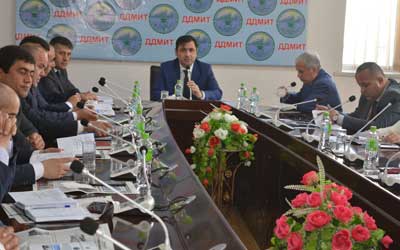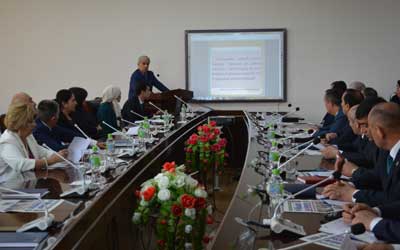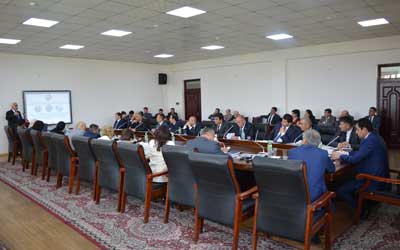News

The Science week has started
Scientific and theoretical conference of the teaching staff, doctoral students, postgraduates and undergraduates of the Tajik State University of Finance and Economics has started. It is dedicated to the 30th anniversary of the State Independence of the Republic of Tajikistan. It was organized within the framework of the "Years of Rural Development, Tourism and Folk Crafts" (2019-2021). It has launched starting from the12th of April at the university.
The conference was opened by the rector of TSUFE Shukrullo Khairzoda. He noted that traditionally every year a Science Week is held at the university, within the framework of scientific and practical conferences are held, summarizing the research activities of the university's faculty.
It should be noted, - the rector stressed, - that over the 30 years of state independence, the science of Tajikistan, continuously developing, and has achieved certain results, the results of scientific research have been effectively applied in production, which directly contributes to the economic development of the country. The conference will continue its work until April 17. The conference participants will listen to and discuss the best reports and articles, previously reviewed and published in a special collection, - said Sh. Khairzoda.
 Then, Professor of the Department of Banking Sharif Rahimzoda made a presentation on the topic "The Impact of Globalization on the Development of the Economy and Banking System". Having considered the consequences of globalization, the professor mentioned both negative and positive economic effects of the globalization influence. The author expressed the negative consequences of the pandemic spread and threats to the world economy, including Tajikistan’s economy.
Then, Professor of the Department of Banking Sharif Rahimzoda made a presentation on the topic "The Impact of Globalization on the Development of the Economy and Banking System". Having considered the consequences of globalization, the professor mentioned both negative and positive economic effects of the globalization influence. The author expressed the negative consequences of the pandemic spread and threats to the world economy, including Tajikistan’s economy.
Sh. Rahimzoda proposed a number of measures to prevent negative consequences caused by the spreading coronavirus epidemic, including: increasing the total number of legal entities in economic entities; preventing the bankruptcy of banks and legal entities; ensuring the efficient operation of the banking system; develop and implement a mechanism for attracting deposits to banks using world experience; moderate use of inflation for the economic development. With a view to sustainable development of the economy, the author proposed a number of promising measures, including: to support economic entities by issuing long-term loans; implementation of quantitative easing policy; acceleration of the process of digitalization of the economy and continuation of the accelerated industrialization of the country. If the above measures are implemented, it will be possible to guarantee the achievement of sustainable economic development, the speaker noted.
 The accelerated industrialization of the country will lead to an increase in the size of the middle class, whose representatives are the guarantors of the socio-economic development of the state. Then, the author of the report reviewed the results of the economic analysis and emphasized that in 2020, due to the spread of the pandemic, the GDP in Tajikistan grew by 4.5%, and the annual inflation was 9.4%. Comparing these indicators with those numbers of foreign countries, the author emphasized that by usage of proven methods of managing the economies of these countries can guarantee economic stability in our country.
The accelerated industrialization of the country will lead to an increase in the size of the middle class, whose representatives are the guarantors of the socio-economic development of the state. Then, the author of the report reviewed the results of the economic analysis and emphasized that in 2020, due to the spread of the pandemic, the GDP in Tajikistan grew by 4.5%, and the annual inflation was 9.4%. Comparing these indicators with those numbers of foreign countries, the author emphasized that by usage of proven methods of managing the economies of these countries can guarantee economic stability in our country.
Then, they listened to the report of Doctor of Economic Sciences, Professor of the Department of World Economy and International Trade of TSFUE Shermamad Jonmamadov on the topic "Informal employment of the Republic of Tajikistan: causes and development." The report examined the history of the formation of informal employment in Tajikistan, the reasons for the emergence of informal employment, and also suggested ways to solve the problems arising in this direction. It was noted that informal economic activity leads to both negative and positive consequences. The positive aspects of informal employment are that it plays a stabilizing role, is a social shock absorber, promotes the realization of entrepreneurial potential and an increase in aggregate demand. The negative consequences of informal employment are: tax evasion, undermining competitiveness with officially operating enterprises, trade in low-quality goods, etc. As the author of the report noted, today in the Republic of Tajikistan more than 249.5 thousand people are engaged in informal economic activity, which is 29.4% of the total number of workers. The professor suggested using the experience of Russia to resolve the issue in the field of informal employment.
After listening to the reports, Professor Koshonova M.R. positively assessed the scientific value of the articles and she noted that they are logical chains of a single link.
After presentation of the authors, arose an interesting discussion on the problems according to the mentioned topics. The conference participants received comprehensive answers to their questions.
In the afternoon, the conference continued its work in 10 sections.
Mashhura Abdulloev

